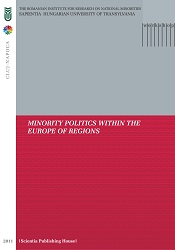The Backstage of a Success Story. Minority Protection in Lithuania
The Backstage of a Success Story. Minority Protection in Lithuania
Author(s): Sebastien Gobert
Subject(s): Politics / Political Sciences
Published by: Scientia Kiadó
Keywords: minority protection;Lithuania;integration; discrimination practices;legal provisions;
Summary/Abstract: Since it declared its independence in 1990, Lithuania has been praised for the consensual integration of its national minorities. Thanks to a favourable demographic situation, the government adopted the socalled‚ ’zero-option’’, that is an inclusive citizenship law, as early as 1989. The further development of minority representative institutions and media allowed Lithuania to overcome most of the problems Estonia and Latvia had been facing. Yet, despite this formal integration, some tensions still occur among minorities, especially among the Polish community, the largest, geographically most concentrated, and most controversial ethnic group. Recurrent rows over the ‚lithuanised’ spelling of Polish names on passports and street signs, as well as regular reports on discrimination in the media have demonstrated the contradiction between a well-achieved formal integration and the persistence of prejudice and discrimination practices among the majority population against the national minorities. Furthermore, the recent introduction of an exclusive dual citizenship law, limited to a part of the ethnic Lithuanians, has highlighted a structural divide between the ‚’ethnos’’ and the ‚’demos’’ among the country’s very citizenry. This research stresses the existing lag between a successful formal integration of Lithuania’s minorities and their persisting status of ‚alien’ in the country’s public discourse. This work intends to provide some elements of understanding on why the inclusive and tolerant integration framework has not yet led to the actual inclusion of the minorities. The study focuses on the case of the Polish community. I investigate the legal provisions regarding minority integration on both domestic and international scale, as well as the different theoretical conceptions of citizenship. I examine then the most sensitive issues related to the participation of ethnic Poles in Lithuanian public life and analyse the short- and long-term consequences of their incomplete inclusion into the Lithuanian public sphere.
Book: MINORITY POLITICS WITHIN THE EUROPE OF REGIONS
- Page Range: 351-366
- Page Count: 16
- Publication Year: 2011
- Language: English
- Content File-PDF

